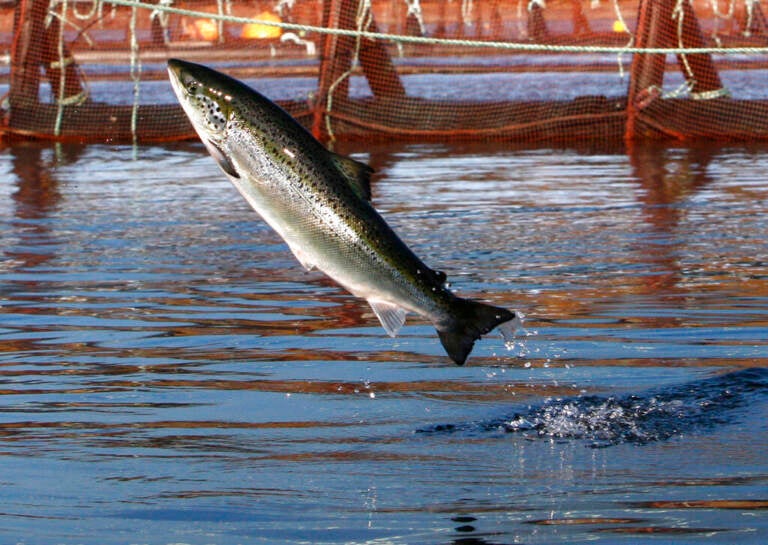‘Salmon Wars: The Dark Underbelly of Our Favorite Fish’
Journalists Douglas Frantz and Catherine Collins expose the danger open-net salmon farming poses to fish, the environment and human health in "Salmon Wars.'
Listen 49:29
FILE - In this Oct. 11, 2008 file photo, an Atlantic salmon leaps out of the water at a Cooke Aquaculture farm pen near Eastport, Maine. (AP Photo/Robert F. Bukaty, File)
We’ve been told eating salmon regularly is good for our diet, with healthy omega-3 fatty acids, and the environment. Farm-raised salmon is also widely available at supermarkets and relatively affordable compared to wild fish. But in Salmon Wars: The Dark Underbelly of Our Favorite Fish, journalists DOUGLAS FRANTZ and CATHERINE COLLINS warn that the farm-raised salmon industry is threatening marine life and human health.
They describe harsh conditions at open-net farms off the coast of Nova Scotia, where tens of thousands of fish are crowded into pens. They become sick and riddled with parasites like sea lice, often so thick that at some plants, workers “use Shop-Vacs to remove them from incoming salmon.” Enormous quantities of pesticides, excrement and excess feed from these farms create a “toxic stew” that rains down and smothers the seabed.
Husband and wife Frantz and Collins join us to discuss the ‘Big Fish’ industry, how it escaped regulations and the dangers it poses to the ecosystem and consumers. They’ll also offer advice about what to do the next time you find yourself at the fish counter.
We recommend
Time Magazine, 3 reasons to avoid farmed salmon – “Many experts and scientific studies cast doubt on the blanket claim that salmon should be part of a healthy diet when the fish comes from open-net farms. Some farmed salmon may be safer than other types, but consumers rarely have enough information to make that choice.”

Subscribe for more Radio Times
WHYY is your source for fact-based, in-depth journalism and information. As a nonprofit organization, we rely on financial support from readers like you. Please give today.




